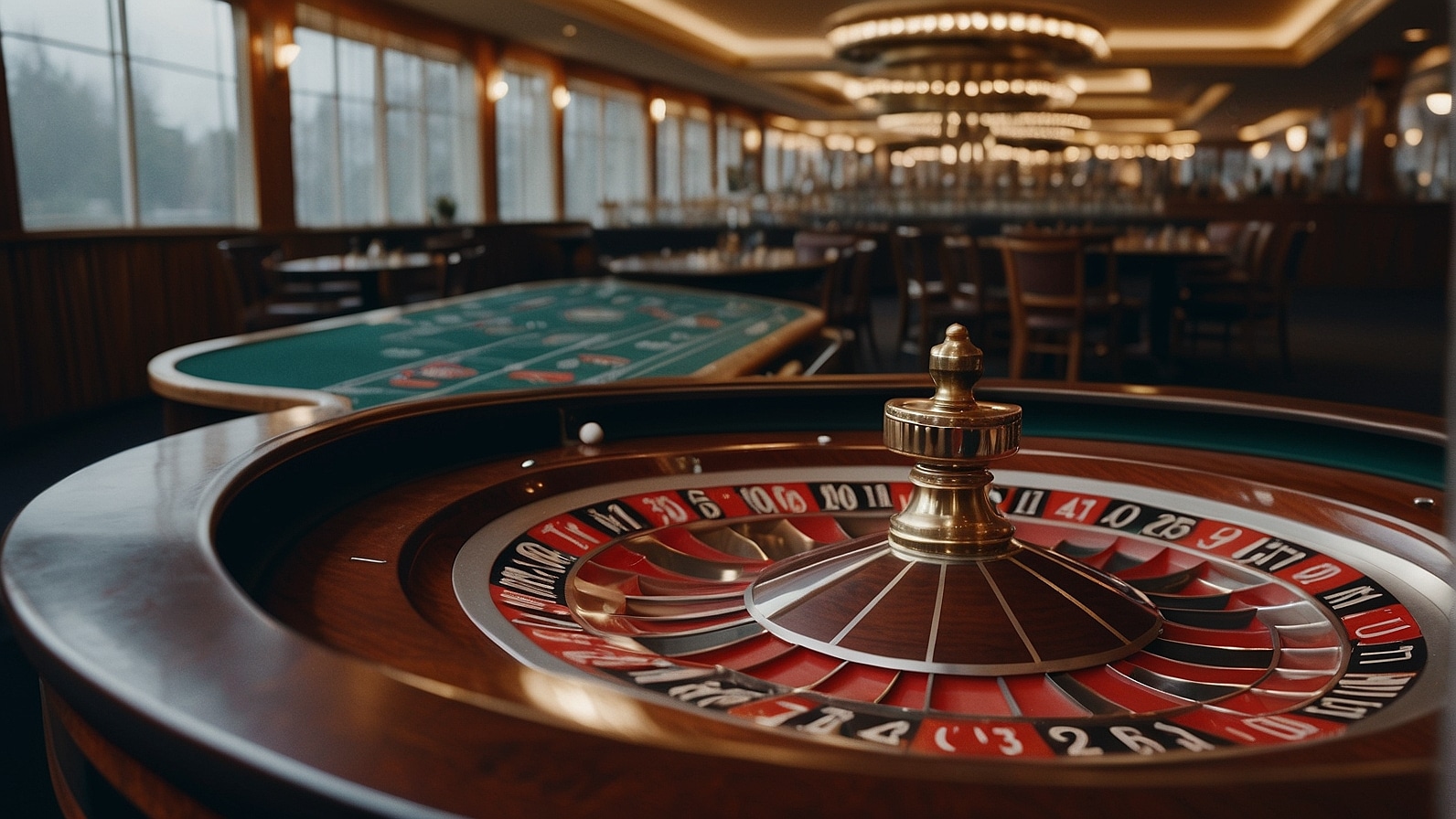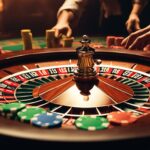13 vs. 00: Analyzing Roulette’s True Culprit
Roulette is a popular casino game that is known for its exciting and unpredictable nature. One debate that has sparked considerable discussion among players is the distinction between the numbers 13 and 00. This article will analyze the true culprit behind this debate and why players need to understand it.
Overview of the 13 vs. 00 debate in roulette
In traditional American roulette, the wheel consists of 38 numbered pockets, including numbers 1-36, 0, and 00. Both 0 and 00 increase the house edge, making it more challenging for players to win. However, some players argue that the number 13 is also unfavorable and should be avoided when placing bets.
The debate stems from superstition and personal beliefs rather than statistical evidence. While some players may attribute bad luck to the number 13, the reality is that each number on the wheel has an equal chance of appearing. The outcome of each spin is determined by random chance, making it impossible for any specific number to be inherently lucky or unlucky.
Importance of understanding the true culprit in roulette
Understanding the roulette wheel’s true nature and the game’s randomness is crucial for players. Players can make more informed bets and improve their chances of winning by basing their decisions on statistical probabilities rather than superstitious beliefs. It is vital to avoid attributing luck or misfortune to specific numbers, as this can lead to irrational betting patterns and unnecessary losses.
In conclusion, roulette’s 13 vs. 00 debate is largely based on superstition rather than facts. By understanding the game’s true nature and focusing on statistical probabilities, players can make smarter decisions and enhance their overall gaming experience.
The Role of the Number 13
Historical superstitions surrounding the number 13
The number 13 has been associated with superstitions and bad luck throughout history. There are various theories on why this number is considered unlucky, ranging from religious and cultural beliefs to historical events. Some people go to great lengths to avoid anything related to the number 13, including skipping floors in buildings or avoiding travel on the 13th day of the month.
Mythbusting the belief that number 13 affects roulette outcomes
Despite the widespread superstitions surrounding the number 13, It is crucial to remember that roulette is a game that relies on luck. The outcome of a roulette wheel spin is determined by random chance and has nothing to do with any specific number being lucky or unlucky.
Casinos and roulette tables are designed to be fair and unbiased, with random number generators ensuring each spin is entirely independent of the previous one. So, if you believe that the number 13 influences the outcome of a roulette game, it’s time to put that superstition to rest.
Roulette is a popular and exciting game of chance. While believing in lucky or unlucky numbers can be tempting, it’s essential to understand that luck plays no role in determining the outcome. So, the next time you’re at the roulette table, feel free to bet on 13 without any hesitation. Your chances of winning or losing are entirely independent of the number itself.
Analyzing the Double Zero (00)
When it comes to the game of roulette, the presence of the double zero (00) can significantly impact the outcome. This article will delve into the origins of the double zero in American roulette and explore how it affects the house edge.
Understanding the origins of the double zero in American roulette
American roulette is unique in that it features both a single zero (0) and a double zero (00), unlike European and French roulette, which only have a single zero. The inclusion of the double zero can be traced back to the early days of roulette in America, where the additional pocket was added to increase the house’s advantage.
While the exact reasoning for adding the double zero is not definitively known, it is believed to have been a way for casinos to increase their profits. Over time, the double zero became a distinguishing feature of American roulette and is still prevalent in casinos across the United States.
Impact of the double zero on the house edge
The presence of the double zero significantly increases the house edge in American roulette compared to its European and French counterparts. In European roulette, the house edge stands at 2.7%, while in American roulette, it rises to 5.26% due to the double zero.
This means that the odds of winning are slightly lower in American roulette, making it a less favorable choice for players looking to maximize their chances of success. However, it is important to note that the allure and excitement of the game can still draw in players despite the higher house edge.
In conclusion, the double zero in American roulette has a notable impact on the game. Understanding its origins and its effect on the house edge can help players decide which type of roulette to play.
The True Culprit: House Edge
Explanation of the house edge concept in roulette
When playing roulette, it’s important to understand the concept of the house edge. The house edge refers to the mathematical advantage that the casino has over the players. In simple terms, it’s the percentage of each bet that the casino expects to keep in the long run.
In the game of roulette, the house edge is determined by the presence of the green 0 and 00 pockets on the wheel. These pockets represent the casino’s advantage, as they are neither black nor red and are not included in any other betting options. This means that even if a player bets on red or black, they still have a chance of losing if the ball lands on the 0 or 00 pocket.
How the house edge determines the casino’s advantage in the game
The presence of the 0 and 00 pockets gives the casino an edge over the players. When the ball lands on these pockets, all bets on black, red, odd, even, high, and low numbers lose, while the casino keeps all the chips placed on those bets. In a European roulette game with only one 0 pocket, the house edge is 2.7%. However, in American roulette with both 0 and 00 pockets, the house edge increases to 5.26%.
Understanding the house edge is crucial when playing roulette. It reminds players that the odds always favor the casino in the long run. While luck and strategy can influence short-term outcomes, the house always maintains an advantage that cannot be
Comparing European and American Roulette
For those passionate about gambling and who enjoy spending time at casinos, the roulette game always presents an exciting challenge. However, understanding the differences between European and American roulette can significantly impact your odds of winning.
Examining the differences between European and American roulette
European roulette is the more popular game version and is characterized by a single zero (0) on the wheel. On the other hand, American roulette features both a single zero (0) and a double zero (00). This seemingly small difference significantly impacts the overall odds of the game.
Effects of the 13 and 00 on the overall game odds
Adding the double zero (00) in American roulette tilts the odds in favor of the house. In European roulette, the house edge is approximately 2.7%, meaning that the casino will win 2.7% of the total bets made in the long run. However, with American roulette, the house edge increases to around 5.26%.
The presence of the extra double zero (00) reduces the probability of winning on individual bets such as red or black, odds or evens, or individual numbers. This creates a higher risk for players, making it more challenging to come out ahead.
To increase your chances of winning, playing European roulette whenever possible is advisable. By avoiding the double zero (00), you significantly improve your odds and potentially maximize your winnings.
In conclusion, understanding the differences between European and American roulette can significantly impact your overall gambling experience. By choosing the version with better odds, you can increase your chances of success and enjoy the thrilling game of roulette even more.
Strategies and Tips for Roulette Players
Effective betting strategies to mitigate the impact of the house edge
When playing roulette, the house edge is a factor that can significantly impact your chances of winning. However, there are a few betting strategies you can employ to minimize its impact:
- Martingale Strategy: This strategy involves doubling your bet after every loss to recover previous losses and make a profit. It can be risky, but it can also be effective if you have a significant bankroll and are willing to take calculated risks.
- D’Alembert Strategy: With this strategy, you increase your bet by a unit after a loss and decrease it by a unit after a win. It aims to achieve a balance between wins and losses and can be less risky than the Martingale strategy.
Tips for maximizing winnings and minimizing losses in roulette
In addition to betting strategies, there are several tips you can follow to maximize your winnings and minimize your losses in roulette:
- Set a budget: Before you start playing, determine how much money you will spend and stick to that budget. To prevent pursuing losses or gambling with amounts that exceed your financial capability, it is advisable to refrain from doing so.
- Choose the right variant: There are various roulette variants available, such as European, American, and French roulette. It’s generally advisable to play European or French roulette as they have a lower house edge than American roulette.
- Know when to walk away: It’s essential to know when to stop playing, especially if you’re on a losing streak. Take breaks, and don’t let emotions guide your decisions.
By implementing effective betting strategies and following these tips, roulette players can increase their chances of winning and have a more enjoyable experience. Remember always to gamble responsibly and within your means.
Conclusion
After thoroughly analyzing the 13 vs. 00 debate in roulette, it becomes evident that the true culprit lies in the house edge. While superstitions and beliefs play a significant role in players’ minds, the house’s mathematical advantage cannot be ignored.
In summary, the analysis revealed several significant findings.
- Both 13 and 00 on the roulette wheel do not significantly alter the odds of winning or losing. The overall probability remains the same, regardless of the number chosen.
- Superstitions and personal beliefs contribute to the perception of “unlucky” numbers. However, these notions have no basis in statistical reality.
- The house edge is the primary factor determining the game’s profitability. Understanding the odds and probabilities associated with different bets is crucial for players to make informed decisions.
Encouraging players to focus on understanding the house edge rather than superstitions
Rather than relying on superstitions or trying to avoid specific numbers, players should focus on understanding the mathematics behind roulette. This includes grasping concepts such as the house edge, odds, and probabilities.
By understanding the game’s mechanics, players can make strategic decisions that maximize their chances of winning. Educating oneself about the game’s mathematics is a more practical approach than relying on superstitions or myths.
In conclusion, debunking the 13 vs. 00 debate highlights the importance of rational thinking and informed decision-making in gambling. By focusing on the facts rather than superstitions, players can enhance their overall roulette experience.


